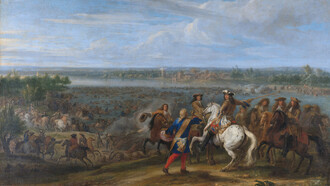William Hazlitt was the youngest of three surviving children born to William and Grace Hazlitt. Known as an essayist and critic, he was first published in 1791 after sending a letter to the Shrewsbury Chronicle condemning the Birmingham riots following Joseph Priestly’s support for the French Revolution. On the Pleasure of Hating was included in The Plain Speaker in 1823.
Hazlitt begins his essay by talking about the spirit of malevolence, in that he dislikes the spider but resists the urge to kill it. Beck argues we learn to curb our spirit of malevolence and keep our actions within the boundaries acceptable by society long before we control our imagination. This means giving up the physical expression of violence rather than the feelings of hostility, “I bear the creature no ill-will, but still hate the very sight of it.” By comparing his actions to a century ago, he is suggesting man has progressed and has learned more self-control. He claims that it will take another hundred years before we feel compassion for the spider rather than mere tolerance. Thus he separates the conscious will from sentimental feeling and the imagination, aligning the latter with mystic horror and superstition.
Locke argues that man is motivated by pleasure or pain, embracing one and avoiding the other. Hazlitt takes a different approach, arguing that mankind needs opposites; it needs something to hate, good and evil, black and white. There is the idea that mankind takes delight in mischief and that pure goodness is boring. For Hazlitt, hating was therapeutic and contrasted with the highly sensitive sensibility of the eighteenth century and the celebration of nature found in the romantic poets. He pointed to Scott’s Scottish novels, which celebrated clan identity and chivalry, as stirring up old rivalries. Before this, gothic novels like The Monk sought to push the boundaries of imaginary evil. As human beings, we delight in watching the suffering of others, whether this is imaginary in a tragic play or executions during the French Revolution. Edmund Burke suggests this sublime pleasure brings the fear of death from something greater than ourselves but allows us to experience this from a position of safety. Equally, the superstition associated with ghosts and witches allows us to fear one and persecute the other. He concludes by suggesting that it is not the quality of the fear of excitement, but the quantity that prevents us from becoming bored or indifferent.
Hazlitt suggests that humanity and civilisation are just a flimsy veil that reveals a wild beast, free, unrestrained and lawless when the veil is thrown away. This individual would reject Bentham’s utilitarianism (the greatest good for the greatest number of people) and only act on what is good for the individual. This follows Hobbes’s view that all men seek self-preservation, which sets one man against the other. Hazlitt argues hatred based on difference makes nationalism an excuse to invade other lands, “carrying fire, pestilence, and famine.” Englishness does not encourage unity for our fellow man, in the early nineteenth century, this was represented by the French, with whom we were at war. Equally, divisions regarding religion, sects, and creeds only give men an excuse to quarrel, which results in violence.
The love of virtue does not denote a desire for self-improvement but rather fosters a stubborn adherence to vice due to a hatred of human frailties. People make the mistake of making the pleasure of hatred a virtue. We become certain that we are right and that the other person is wrong. If hatred was directed at injustice, poverty, and hunger, it could bring positive change. People usually talk their way out of hating by reflecting on the fact that we are not perfect. Hazlitt is therefore giving us permission to indulge in our base nature. We may hate mistakes but are not satisfied with good deeds either. Eventually, we hate so much that we even hate ourselves. This is the spiralling and corrosive nature of hate.
Hazlitt does not care what people say about him, it is the looks of disdain that affect him. He talks about becoming complaisant about reading favourite books to the point that they become indifferent. Immediately following the French Revolution, there was an aspiration for liberty, but it was followed by war with France and a repressive government at home, leading to despotism, slavery, and superstition. The revolutionary writers of Godwin and Bentham, whom he argued relied too much on reason and did not take account of man’s frailties. However, he was even more critical of Southey, Coleridge, and Scott, whom he referred to as superficial, ineffective, and intolerant.
This essay ranges from the abstract as an aversion to the spider, through society with religion, politics, and popular culture, finally ending with his friends and finishing with himself. All the analysis is geared toward self-examination and exposing our own faults. An excess of friendly relations leads to an insipid culture, according to Hazlitt.















